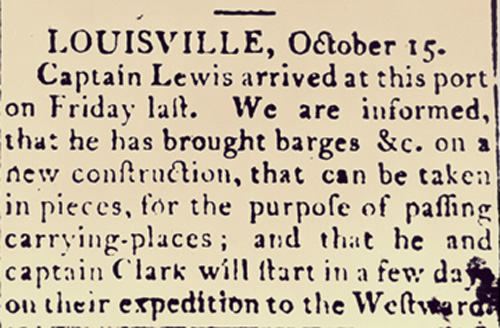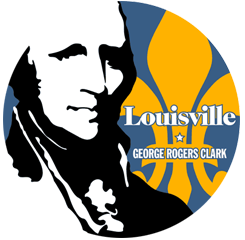Lewis and Clark Expedition: Unveiling the Odyssey from Louisville to the Uncharted West
Embarking on a journey that would become one of the most celebrated chapters in American history, Meriwether Lewis and William Clark, two intrepid explorers, set out on the Lewis and Clark Expedition in 1803. This daring venture not only laid the foundation for westward expansion but also weaved an intricate tapestry of exploration, diplomacy, and survival. As we dive into the annals of this odyssey, let’s uncover the ties that bind the Lewis and Clark Expedition to the vibrant city of Louisville, Kentucky.
Setting the Stage: The Louisiana Purchase and Louisville’s Role
The year was 1803, and the United States was on the brink of a transformative acquisition—the Louisiana Purchase. With the stroke of a pen, President Thomas Jefferson doubled the size of the young nation, acquiring a vast expanse of land from the French. This strategic move set the stage for one of the most ambitious expeditions in American history—the Lewis and Clark Expedition.
Louisville, situated on the banks of the Ohio River, played a crucial role in the logistics of the expedition. The city’s strategic location as a river hub made it a natural starting point for journeys into the uncharted territories. As Lewis and Clark prepared for their epic expedition, they found an ally in Louisville—a city that would be both a launchpad and a vital supply point for the challenging voyage that lay ahead.
Meriwether Lewis: The Man with a Plan
At the helm of the expedition was Meriwether Lewis, a skilled frontiersman and Jefferson’s personal secretary. Lewis was not only well-versed in the art of survival in the wilderness but also a man of keen intellect. His early life and military career had groomed him for the challenges that awaited him in the vast, unknown West.
Lewis’s connection to Louisville was not just logistical; it ran deeper. He recognized the city’s significance as a gateway to the frontier, a jumping-off point for expeditions into the wilderness. As Lewis made preparations for the journey, Louisville became a bustling hub of activity, with supplies, provisions, and eager volunteers converging on the city to be part of this historic endeavor.
William Clark: A Complementary Force
William Clark, a skilled military officer and frontiersman in his own right, joined forces with Lewis to lead the Corps of Discovery. Clark’s expertise in cartography and navigation complemented Lewis’s knowledge of the natural sciences, creating a dynamic duo ready to tackle the challenges of the unknown.
While Clark didn’t have the same direct ties to Louisville as Lewis did, he quickly became familiar with the city’s role as a launching point for western exploration. As the expedition geared up, Clark found himself in the heart of Louisville, preparing for the arduous journey that awaited him and the Corps of Discovery.
Gathering Forces in Louisville: The Corps of Discovery Takes Shape
Louisville buzzed with activity as the Corps of Discovery assembled. Volunteers from various walks of life, drawn by the allure of adventure and the promise of uncharted territories, flocked to join Lewis and Clark. Louisville’s role as a melting pot of people from different backgrounds mirrored the diverse composition of the expedition itself.
The city’s waterfront, alive with the spirit of exploration, witnessed the construction of the expedition’s vessels—the keelboat and two smaller pirogues. The meticulous preparations underscored the gravity of the journey, and as the vessels took shape, so did the dreams of those who were about to embark on this unprecedented adventure.
The Departure: A Farewell from Louisville to the West
On October 14, 1803, the Corps of Discovery bid farewell to Louisville, setting sail on the Ohio River. The city that had nurtured their preparations now stood witness to the departure of a group of pioneers venturing into the unknown. As Lewis and Clark sailed westward, they carried not only the hopes and dreams of a young nation but also the spirit of Louisville, a city that had played an integral role in the genesis of their journey.

Navigating the Uncharted Waters: Challenges and Triumphs
The expedition faced a series of challenges as they navigated the waterways and trekked through uncharted territories. From encountering unfamiliar landscapes to forging relationships with Native American tribes, Lewis and Clark relied on their resourcefulness and adaptability. The skills they honed in the wilderness were a testament to their resilience and the comprehensive preparations made back in Louisville.
Sacagawea: A Louisville Connection to the Expedition
As the expedition ventured into the West, a pivotal figure emerged—Sacagawea. A Shoshone woman captured in her youth and later married to French-Canadian trapper Toussaint Charbonneau, Sacagawea became an invaluable asset to the Corps of Discovery. She served as a translator and diplomat, bridging communication gaps with Native American tribes encountered along the way.
Sacagawea’s story takes an interesting turn when we trace it back to Louisville. Charbonneau, her husband, was hired by Lewis and Clark in St. Louis. It was in this city, not far downstream from Louisville, that the couple became part of the expedition. The interconnectedness of the journey, stretching from the banks of the Ohio to the Great Plains, highlights the vast network of relationships and alliances that fueled the success of the Lewis and Clark Expedition.
Wintering at Fort Mandan: The Louisville Spirit Endures
As the expedition pressed onward, facing the harsh winter conditions of the Upper Missouri, the spirit of Louisville endured in the resilience and determination of the Corps of Discovery. Fort Mandan, the expedition’s winter quarters, became a temporary home and a testament to the adaptability of Lewis and Clark’s team.
While the winds howled across the prairies and the snow piled up outside Fort Mandan, the explorers maintained their focus on the mission. Scientific observations, diplomatic efforts, and the meticulous documentation of their journey continued, echoing the thorough preparations made back in Louisville.
The Pacific Northwest: Triumph and Reflection
After an arduous journey that covered thousands of miles, the Corps of Discovery finally reached the Pacific Ocean in November 1805. The sight of the vast expanse of the Pacific Northwest was a moment of triumph and reflection for Lewis and Clark. Their success in reaching the westernmost point of the continent marked not only a geographical achievement but also a testament to the human spirit’s capacity for exploration and discovery.
Return to Louisville: A Heroic Homecoming
The return journey was no less challenging, but the knowledge gained and the relationships forged during the expedition paved the way for a successful return to Louisville. On September 23, 1806, the Corps of Discovery, battle-hardened and filled with tales of the West, returned to the city that had been both the starting point and a crucial logistical hub for their historic journey.
The homecoming in Louisville was a moment of celebration and reflection. The expedition, which had left with dreams and uncertainties, returned as national heroes. Louisville, proud of its connection to this monumental achievement, welcomed Lewis and Clark with open arms.
Legacy and Commemoration: Louisville’s Mark on History
Today, Louisville proudly bears the legacy of being a launchpad for one of the most iconic expeditions in American history. The city’s connection to the Lewis and Clark Expedition is commemorated through various historical markers, museums, and events that celebrate the spirit of exploration and discovery.
The Frazier
History Museum, situated in downtown Louisville, is a treasure trove of artifacts and exhibits related to Lewis and Clark. Visitors can immerse themselves in the history of the expedition, gaining a deeper understanding of the challenges faced and the triumphs achieved.
A Tale of Exploration and, Perseverance
The Lewis and Clark Expedition stands as a testament to the indomitable human spirit and the thirst for exploration that defines America’s history. From the planning stages in Louisville to the triumphant return, the expedition encapsulates the values of preparation, adaptability, and the pursuit of knowledge.
Louisville’s role as the springboard for this epic journey is not just a historical footnote but a vibrant thread woven into the fabric of American history. As we celebrate the Lewis and Clark Expedition, let us also celebrate the city of Louisville—a place where dreams set sail on the Ohio River, bound for the uncharted territories of the West. The echoes of Lewis and Clark’s journey continue to resonate, reminding us that, like the Corps of Discovery, we too can navigate the unknown with courage, curiosity, and the enduring spirit of exploration.
